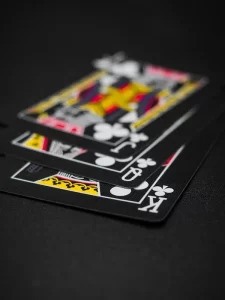Playing poker like a pro requires a combination of essential skills and the right mindset. It’s not just about knowing the rules and strategies, but also about being able to read your opponents, manage your emotions, and make calculated decisions. In this article, we will explore the key skills and mindset that are necessary for success in poker. Whether you’re a beginner or an experienced player, these tips will help you take your game to the next level.
Mastering the Art of Bluffing in Playing Poker
To master the art of bluffing, you need to have a good understanding of the game. You need to know the rules, the different hands, and the odds of winning. You also need to be able to read your opponents and understand their playing style. This will help you determine when to bluff and when to fold.
Timing is everything when it comes to bluffing. You need to choose the right moment to make your move. Bluffing too early or too often can be a costly mistake. You need to wait for the right opportunity to present itself. This could be when your opponents are playing cautiously or when they have a weak hand.
Another important aspect of bluffing is your body language. You need to be able to control your emotions and not give away any clues about the strength of your hand. This means maintaining a poker face and not reacting to the cards that are dealt. You also need to be aware of your opponents’ body language. Look for any signs of nervousness or hesitation, as this could indicate that they are bluffing.
Bluffing is not just about making your opponents believe that you have a better hand. It is also about creating a certain image of yourself at the table. You want to be seen as a confident and aggressive player. This will make your opponents think twice before challenging you.
However, bluffing should not be overused. It is a risky strategy that can backfire if not executed properly. You need to be able to recognize when your bluff has been called and be prepared to fold if necessary. It is also important to vary your playing style and not rely solely on bluffing.
In addition to the skills required for bluffing, you also need to have the right mindset. You need to be able to handle the pressure of the game and not let your emotions get the best of you. This means staying focused and not getting distracted by outside factors. It also means being able to accept losses and not letting them affect your future decisions.
To sum up, mastering the art of bluffing is essential for success in playing poker. It requires a good understanding of the game, the ability to read your opponents, and the right timing. It also requires a certain mindset that can handle the pressure of the game and not let emotions get in the way. Bluffing is a risky strategy, but when executed properly, it can be a powerful tool in your arsenal.
The Importance of Bankroll Management in Playing Poker Like a Pro
One of the most important aspects of bankroll management is setting a budget. Before you start playing, you need to determine how much money you can afford to lose. This will help you avoid overspending and prevent you from chasing losses. It is also important to stick to your budget and not exceed it, even if you are on a winning streak.
Another important aspect of bankroll management is choosing the right stakes. You should always play at a level that is appropriate for your bankroll. Playing at stakes that are too high can quickly deplete your funds, while playing at stakes that are too low can limit your earning potential. As a general rule, you should have at least 20 buy-ins for the stakes you are playing. For example, if you are playing at a $1/$2 table, you should have a bankroll of at least $4,000.
In addition to setting a budget and choosing the right stakes, you should also track your results. Keeping track of your wins and losses will help you identify your strengths and weaknesses and make adjustments to your game. It will also help you determine if you are playing at the right stakes and if your bankroll is sufficient.
Another important aspect of bankroll management is knowing when to quit. It can be tempting to keep playing when you are on a winning streak, but it is important to know when to walk away. This will help you avoid losing your winnings and prevent you from chasing losses. It is also important to take breaks and not play for extended periods of time. This will help you stay focused and avoid making costly mistakes.
Finally, it is important to have a long-term perspective when it comes to bankroll management. Poker is a game of variance, and even the best players can experience losing streaks. It is important to have a sufficient bankroll to weather these storms and avoid going broke. This means that you should not spend all your winnings and should always have a reserve fund for emergencies.
In conclusion, bankroll management is an essential skill for playing poker like a pro. It requires discipline, patience, and a long-term perspective. By setting a budget, choosing the right stakes, tracking your results, knowing when to quit, and having a reserve fund, you can avoid going broke and increase your chances of success. Remember, poker is a marathon, not a sprint, and bankroll management is the key to staying in the game.
Developing a Winning Mindset in Playing Poker
Developing a Winning Mindset in Playing Poker
The first step in developing a winning mindset in playing poker is to understand that it is a game of skill and strategy. Luck plays a role, but it is not the only factor that determines the outcome of the game. You need to focus on making the right decisions based on the information available to you.
One of the essential skills you need to develop is the ability to read your opponents. You need to be able to analyze their behavior, body language, and betting patterns to determine what kind of hand they have. This skill takes time to develop, but it is essential if you want to be a successful poker player.
Another important skill is the ability to manage your emotions. Poker can be a stressful game, and it is easy to get frustrated or angry when things don’t go your way. You need to be able to stay calm and focused, even when you are on a losing streak. This will help you make better decisions and avoid making costly mistakes.
To develop a winning mindset, you also need to be disciplined. You need to have a plan and stick to it, even when things get tough. This means setting limits on how much you are willing to bet and when to walk away from a game. It also means avoiding distractions and staying focused on the game.
Finally, you need to have a positive attitude. You need to believe in yourself and your abilities as a poker player. This will help you stay motivated and focused, even when things are not going your way. A positive attitude will also help you learn from your mistakes and improve your game over time.
Conclusion
Developing a winning mindset in playing poker takes time and effort, but it is essential if you want to be a successful player. You need to focus on developing the essential skills, such as reading your opponents, managing your emotions, being disciplined, and having a positive attitude. With practice and dedication, you can become a pro at playing poker and enjoy the rewards that come with it.
Reading Your Opponents: Essential Skill in Playing Poker Like a Pro
The first step in reading your opponents is to pay attention to their behavior. Are they nervous or confident? Are they fidgeting or sitting still? These behaviors can give you clues about their hand strength. For example, a nervous opponent may have a weak hand, while a confident opponent may have a strong hand.
Body language is another important factor in reading your opponents. A player who is leaning forward and staring intently at the cards may have a strong hand, while a player who is slouching and avoiding eye contact may have a weak hand. It is also important to pay attention to the way your opponents handle their chips. A player who is stacking their chips neatly may be more organized and confident, while a player who is scattering their chips may be more disorganized and nervous.
Betting patterns are also crucial in reading your opponents. A player who consistently bets aggressively may have a strong hand, while a player who consistently checks or calls may have a weak hand. It is also important to pay attention to the size of your opponents’ bets. A small bet may indicate a weak hand, while a large bet may indicate a strong hand.
In addition to observing your opponents’ behavior, body language, and betting patterns, it is also important to consider their playing style. Is your opponent a tight player who only plays strong hands, or a loose player who plays a wide range of hands? Knowing your opponents’ playing style can help you make better decisions about your own hand.
However, it is important to remember that reading your opponents is not an exact science. Your opponents may try to deceive you by displaying false behaviors or betting patterns. It is important to remain vigilant and not rely solely on your observations.
To improve your ability to read your opponents, it is important to practice and gain experience. Play as many hands as possible and pay attention to your opponents’ behavior, body language, and betting patterns. Over time, you will develop a better understanding of your opponents and be able to make more informed decisions about your own hand.
In addition to developing your skills in reading your opponents, it is also important to have the right mindset when playing poker. A successful poker player must be patient, disciplined, and able to control their emotions. It is important to remain calm and focused, even when facing difficult opponents or bad beats.
In conclusion, reading your opponents is an essential skill in playing poker like a pro. It involves observing your opponents’ behavior, body language, and betting patterns to determine their hand strength and possible actions. However, it is important to remember that reading your opponents is not an exact science and requires practice and experience. In addition to developing your skills in reading your opponents, it is also important to have the right mindset when playing poker. A successful poker player must be patient, disciplined, and able to control their emotions.
Staying Focused and Disciplined: Keys to Success in Playing Poker
Playing poker is not just about luck. It requires a combination of skills and mindset to succeed. One of the most important aspects of playing poker like a pro is staying focused and disciplined. In this article, we will discuss the essential skills and mindset needed to stay focused and disciplined while playing poker.
The first skill that is essential for staying focused and disciplined is patience. Patience is the ability to wait for the right moment to make a move. In poker, patience is crucial because it allows you to wait for the right cards and the right opportunities to make a move. Without patience, you may be tempted to make impulsive decisions that can lead to losses.
Another important skill for staying focused and disciplined is self-control. Self-control is the ability to control your emotions and impulses. In poker, self-control is essential because it allows you to make rational decisions based on the cards and the situation at hand. Without self-control, you may be tempted to make decisions based on your emotions, which can lead to losses.
In addition to patience and self-control, focus is also essential for playing poker like a pro. Focus is the ability to concentrate on the game and block out distractions. In poker, focus is crucial because it allows you to analyze the situation and make the best decisions possible. Without focus, you may miss important details and make mistakes that can lead to losses.
Discipline is another key aspect of playing poker like a pro. Discipline is the ability to stick to a plan and follow through with it. In poker, discipline is essential because it allows you to stick to your strategy and avoid making impulsive decisions. Without discipline, you may be tempted to deviate from your plan, which can lead to losses.
To stay focused and disciplined while playing poker, it is also important to have a positive mindset. A positive mindset is one that is focused on success and growth. In poker, a positive mindset is essential because it allows you to stay motivated and focused on your goals. Without a positive mindset, you may become discouraged and give up on your goals.
Finally, it is important to have a growth mindset when playing poker. A growth mindset is one that is focused on learning and improving. In poker, a growth mindset is essential because it allows you to learn from your mistakes and improve your skills. Without a growth mindset, you may become complacent and stop improving, which can lead to losses.
In conclusion, playing poker like a pro requires a combination of skills and mindset. Staying focused and disciplined is essential for success in poker. Patience, self-control, focus, discipline, a positive mindset, and a growth mindset are all essential skills and mindset for playing poker like a pro. By developing these skills and mindset, you can improve your chances of success in poker and achieve your goals. Playing poker like a pro requires a combination of essential skills and the right mindset. These skills include understanding the game’s rules, mastering basic strategies, and developing the ability to read opponents. The right mindset involves discipline, patience, and the ability to manage emotions. By honing these skills and adopting the right mindset, players can increase their chances of success at the poker table.




